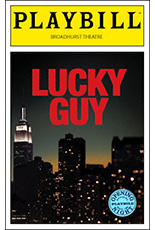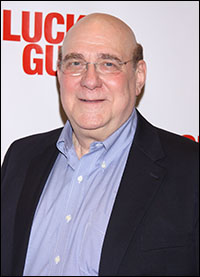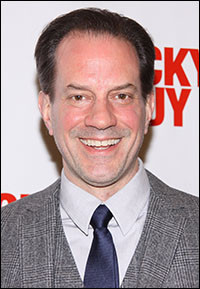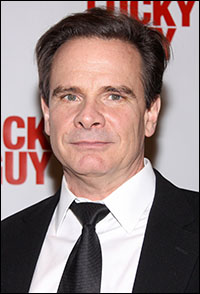
*
The ghosts of a couple of tabloid scribes—maybe even the ghost of journalism itself—hovered over the opening of Lucky Guy April 1 at the Broadhurst. One belonged to the title character, Mike McAlary, who tagged all three tabloid bases in the area during his 41 years, and the other to his Boswell, Nora Ephron, who once toiled as the Post reporter before moving on to better things like a procession of popular “chick flicks” but never quite recovered from her love of newspapering.
She was allowed the evening’s last tug at the heartstrings when her portrait was flashed on the stage after the curtain call. It broke up the cast, all lined up in a row—including, the star she finally got to Broadway in the role of McAlary: Tom Hanks.
Author and subject never met, but after his death, she decided his flamboyant career best encapsulated her love of the profession. And why not? Here is a guy—a not-particularly-lucky guy who came to the field scoop-crazed, believing the myths of newspaper movies and adopting the hot-shot, fast-talking behavior of The Front Page’s Hildy Johnson. Occasionally, his stories caught up with his ego, but there were also setbacks and wrong calls along the way—and a bad car crash. Through it all, he kept blithely bouncing back and forth from Newsday to Post to Daily News to Post. Eventually—and here’s where the luck comes in—he gets his redemptive big story, delays his cancer treatment to do it and grabs a Pulitzer on his way out the door.
George C. Wolfe’s fluid direction keeps the numerous short scenes in this story in a quickened and eventful swirl, with an ensemble cast moving smoothly in and out of characters, bars, newsrooms, taverns, hospitals, saloons, bedrooms, et al. Hanks handily dominates the proceedings in his high-octane Broadway debut, but it’s one of those ensembles where everybody works, and The Star certainly welcomes the sharing since he’s doing some pretty heavy lifting with the role as it is.
[flipbook] “It’s a beast,” he admitted about his newfound stage demands, later at the Gotham Hall after-party. “I might have had a little more time off in the earlier drafts, but not any more. But we all work. This is not just a couple of guys at a lectern with some slides going by. There are 14 of us on stage, and I’d say 12 of us have very important things to do. Everybody gets to play. That’s more fun than doing it any other way.”
There are moments when Hanks bears an uncanny resemblance to McAlary—mostly when he smiles and his eyes crinkle above a commanding mustache. “He had a real bristle brush. It stuck out. Mine hangs down. It’s a different kind of thing. This is the best I could do.” Off-stage, he has grown accustomed to his new shrubbery. “I had to make my peace with it, but now I don’t think I even have it anymore.”
His is such a fully-formed performance one might well wonder where he has been keeping himself all these years. First, he dirt-kicks (“Well, I didn’t have the chops for a long time. Broadway is a place of accomplished singers and dancers”), and then he responds with the real reason: “I can’t say the opportunity was always there because it wasn’t, and eventually it came around, but, quite frankly, I was in my child-bearing years to take this on. I had kids, and I don’t think you can just go off and say, ‘Dad is going to go away and try to have a Broadway play to last more than ten performances.’ It’s not fair to them. My kids are all grown up, so here I am.”
The fact that Lucky Guy was written by Ephron most likely gave him the extra shove he needed to get to Broadway. The two previously teamed (she as writer and/or director) on “A League of Their Own,” “Sleepless in Seattle” and “You’ve Got Mail.”

Buy this Limited Collector's Edition |
“Nora was one who had a huge affection for the tabloids. She read them every day, and she paid attention to all the writers and all the bylines. She knew it because she did not censor the fact that it’s a pulse of something—it measures something.” He said he has been won over to Ephron’s way of thinking about tabloids. “I kinda get it now,” he confessed. “I get it as an art form. I get it as a job. I get it as a thing that really does, somehow, serve the pulse of a city because there’s no wi-fi in the subway. It’s better to be reading the Post or the News than playing angry birds. I think they both do a thing. I think you get the hearts and the clubs in one paper, and you get the diamonds and the spades in the other. Together, they make a full deck.”
| |
 |
|
| Richard Masur | ||
| Photo by Joseph Marzullo/WENN |
Jim Dwyer, now of The New York Times and depicted in his Newsday days by Michael Gaston, owned up to four previews prior to attending the opening night. “Every time I’ve seen it, it gets better,” he said. “That’s been a real education for me as a non-theatre person to see the amount of revision and improvement and struggle with the material that goes on. You go to the show one time. You think that’s the show. It’s not. It’s such a dynamic process. I’ve seen a script from three years ago, and I’ve seen a script from a year ago, and now I see the live script continuing to evolve, so it’s that process of continuing demands that is so impressive to me.”
An unrecognizable Richard Masur—he shaved his head to play Post editor Jerry Nachman—knew Ephron since “Heartburn,” the 1986 movie Mike Nichols made about her marriage breakup with Carl Bernstein and counts himself lucky. “Aside from Tom and George, nobody really knew her,” he said, “and, for them, this is a huge hole in the process. For me, I saw it as a celebration. I wasn’t sad. I was happy for her it went like it did. She trusted George to follow through on this, and he did. He made sure this was her vision realized. He had a bible full of different versions that had occurred at a different time. When something wasn’t working, George would reach into the bible. It’s all Nora’s language. I hope she gets recognized for it.”
Hayes, the attorney who negotiated big decimal leaps for McAlary, is played by Christopher McDonald, who was a lawyer his last time on Broadway: “I did a little Billy Flynn for a while in Chicago. I was like Billy Flynn #27 back in 2005-2006.”
| |
 |
|
| Danny Mastrogiorgio | ||
| photo by Joseph Marzullo/WENN |
He only glancingly has met the reporter he plays, Drury. “I met him briefly, about 15 minutes, a couple of weeks ago for a picture in The Times. This is the first night he’s seen it. He said, ‘First of all, I’m digesting this a lot. And second of all, you really portrayed that time, that era, right.. Just on a personal level, it’s hard to digest it all.’”
Representing her gender in the newsroom all by herself, Deirdre Lovejoy runs an extreme gamut—from potty-mouth reporter Louise Imerman to cool ax-swinging lady executive Debby Krenek. Her favorite she can’t decide, “but I have to say, in terms of color, Louise is very dear to my heart and a crowd favorite. I think Nora very cleverly showcased in a very economical way what the woman’s place was in the newsroom back then and the evolution of that through Act Two.”
Neither lady has she met. “I think that that was very conscious on George Wolfe’s part,” Lovejoy relayed. “He wanted us to serve the play. He wanted us not to get tied to anything in particular. We’re all playing real people, and that can be problematic so he kept us away from that and just concentrated on the play.”
| |
 |
|
| Peter Scolari | ||
| Photo by Joseph Marzullo/WENN |
Rehearsals were a joy, he said. “George really creates a lot of areas for actors. ‘Hey, have a go at this area, look at these personal values, ask these questions, fulfill something for me here in this text, and I don’t know what it is.’ It’s a George Wolfe Conundrum. ‘I don’t know what I want you to get done. Do something. You’re an actor. Be interesting.’”
Courtney B. Vance, no stranger to newspaper sagas (he and his wife, Angela Bassett, did a John Guare adaptation of “His Girl Friday” at the Guthrie), plays McAlary’s favorite (indeed, indispensible) editor, Hap Hairston. “It was a very, very contested relationship,” he said, “but they needed each other. When they were apart from each other, McAlary’s work wasn’t as good. Hap wouldn’t let him get away with stuff.”
Lucky Guy’s lead producer and prime mover, Colin Callender, first encountered the script when he was an executive at HBO. “Nora brought it to me as a film, and we could never make it because we couldn’t cast it,” he recalled. “Then, when I left HBO and I knew I wanted to produce theatre, I called her, and I said, ‘I think this could be a play.’ She said, ‘I dunno. I have to think about it,’ and two weeks later, she called me and said, ‘I’ve written it.’ So it’s taken that journey from then till now.”
The choice of director was obvious to them. “We wanted George from the beginning, but he was not available at first. When he was, we did a reading with Tom in January of last year. Tom loved the experience and he had great confidence in George.” Ephron’s death did not derail the project. “Nora and I have spent so much time together with George that she’s been here every step of the way—and she was in the theatre tonight. I’ve never doubted for a minute that she’s been part of this process.”
Director Wolfe found the play hard to resist. “I love that it’s about New York, a kind of tribalism here. I love it’s about the mad ambition it takes to accomplish anything in the city and the grace you discover about yourself at certain times in your life.”
The pivotal moment in the play is a terse, tense two-page scene in which McAlary interviews Abner Louima, the immigrant brutally sodomized with a toilet plunger by police, gathering the story that will win him the Pulitzer, and Stephen Tyrone Williams plays it beautifully to a hushed house. “You have these moments in a place where everything stops—no one speaks—no one moves on stage or in the audience. To me, it feels like a shared experience. All these different people are sharing the same moment. For that one moment, we’re all on the same page. It feels electric!”
Williams did not actually meet Louima, but he didn’t stint on researching the role. “It’s like putting together eyewitness accounts and police affidavits,” he explained, “then coming up—because there are several versions of what happened—something I felt was plausible of what actually happened. That was my ride into it, and George was very nuanced and very sensitive. He set up a rehearsal room where I felt safe. I’m a benefactor of all the work that the cast has done from the beginning of the show. I’m the lucky guy who gets to be in the scene that’s the pay-off.”














































































































